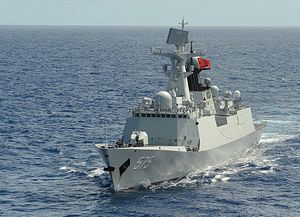A few must-reads to kick off your week:
Over at CSIS’s continuously excellent Asia Maritime Transparency Initiative, James Kraska writes compellingly in favor of the United States having its naval assets conduct transit in innocent passage near China’s newly built man-made islands in the South China Sea. The issue was the subject of some debate between the U.S. Department of Defense and the White House earlier in the summer, and recent news of the People’s Liberation Army-Navy (PLAN) having lawfully traversed U.S. territorial waters around the Aleutian Islands near Alaska has brought the issue back to the fore.
Over at 38North, Carla Freeman reviews China’s current position on nuclear talks with North Korea, both within the framework of the long-stalled Six-Party Talks and other formats. Senior Chinese officials, including the foreign minister, Wang Yi, have hinted that the process toward the Joint Comprehensive Plan of Action on Iran’s nuclear program could bear lessons for handling North Korea’s program. Freeman wraps up the varying opinions within China on the possibility that the Iran deal could bode positively for the North Korean issue, highlighting mostly skepticism among the Chinese expert community.
Over at India Today, Christine Fair has a trenchant and succinct catalog of how Pakistan’s Inter-Services Intelligence manufactured a bevy of anti-India militant proxy groups, including Lashkar-e-Taiba, the group responsible for the devastating 2008 terror attacks in Mumbai that claimed scores of lives.
At POLITICO Europe, Tunku Varadarajan tells the odd tale of how Mohammad Zahoor, a Pakistani and “Ukraine’s richest expat,” became the owner of Ukraine’s Kyiv Post, a major Ukrainian English-language newspaper.
If you missed it, the New Yorker‘s Evan Osnos has a thoughtful piece on the reasons China felt it necessary to hold its September 3 parade commemorating victory in the “Chinese People’s Resistance Against Japanese Aggression and World Anti-Fascist War.”
Finally, check out our latest podcast, where I speak with SinoNK‘s Adam Cathcart about the current state of relations between North Korea and China (hint: they’re not great) and how Pyongyang and Beijing are managing this important bilateral relationship.

































